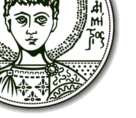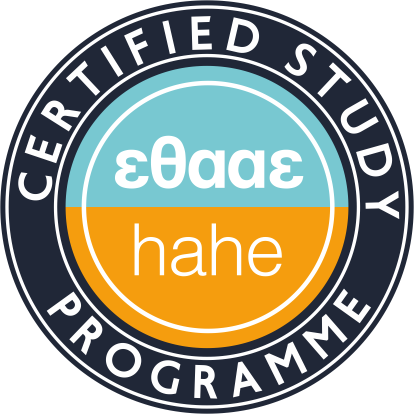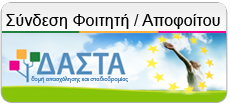Programme Profile
Qualification awarded
Μεταπτυχιακό Δίπλωμα Ειδίκευσης, Μ.Δ.Ε. | Metaptychiako Diploma Eidikefsis-Postgraduate Degree of Specialisation
Level of qualification
Postgraduate (2nd Cycle)
Specific admission requirements
Α Degree awarded by a Greek Public University or by a recognized foreign Institution of equivalent status or by a Technological Education Institute is required.
Qualification requirements and regulations, profile of the programme and Key learning outcomes
Ancient Greek Philology aims at: (a) the study and interpretation of ancient Greek literary texts in the original, (b) the acquaintance of the students with modern trends in ancient Greek philology, such as narratology, reception and translation, gender studies and literary criticism, (c) the critical assessment of theoretical problems concerning the ancient Greek literary genres, (d) the analysis of ancient Greek literature within the historical and cultural contexts of each period, as well as its comparative reading with Latin literature, and (e) the in-depth acquaintance of the students with disciplines such as palaeography, papyrology, epigraphy and textual criticism.
Latin Philology aims at: (a) furthering the study and the interpretation of Latin literary texts, (b) the evolution and the sharpening of the studentsʼ critical judgment, with a view to a better appreciation of Latin texts, (c) the critical assessment of theoretical problems concerning Latin literary genres, (d) setting Latin literary texts within their broader historical and cultural contexts as well as a comparative reading of these texts at the backdrop of later literature, and (e) an in-depth acquaintance of students with papyrology, palaeography, epigraphy and textual criticism.
Modern Greek Literature aims to: (a) train students in research methodologies, (b) familiarize them with specific subjects in poetry, prose, criticism, literary movements and trends, the history of writing and printing, publishing, bibliography, the teaching of Literature (c) develop their critical and analytical thought aiming at a creative meditation on the above mentioned subjects as well as subjects regarding the History of Modern Greek Literature and Culture (d) introduce interdisciplinary approaches to Modern Greek Literature (e.g. Literature and Art/and Medicine) (e) familiarize them with new technologies (f) design and process print and digital publications of Modern Greek fictional and non fictional texts, and (g) design and process bibliographies.
Medieval Greek Literature aims at the acquaintance of students with: (a) literary theories and methods of studying, analyzing and interpreting medieval Greek texts, (b) the cultural context in which the literary genres have been developed, (c) scientific research and writing of papers in the field of medieval Greek literature, (d) textual criticism and editorial technique applicable to medieval Greek texts, (e) the conditions of the manuscript transmission of medieval Greek texts, and (f) the relevant auxiliary disciplines of philological research.
General and Comparative Literature offers courses that aim to provide a theoretical framework for the study of Literature (Literary Theory), to discuss ideas and movements in European Literature from the late Middle Ages to our days, to compare literary texts written in Greek with texts written in other languages and to follow the reception of texts originating from Antiquity to the present time.
Theoretical Linguistics aims at: (a) the acquaintance of students with contemporary linguistic schools of thought, linguistic theories and models of analysis, (b) the development of their critical thinking and analytical skills that will allow them to develop accurate grammatical descriptions of Greek and other languages, to construct solid theoretical analyses at all grammatical levels (syntax, morphology, phonology, semantics, etc.) and to model natural grammars, (c) the study of critical discourse analysis and of issues of interface between grammatical gender and sex, (d) their acquaintance with fundamental questions of psycholinguistic research and central problems of the philosophy of language, and (e) the inter-disciplinary and cross-linguistic investigation of language.
Applied Linguistics aims at: (a) the acquaintance of students with interdisciplinary topics which mediate between the theory of language and its numerous applications, (b) the comprehension of theoretical approaches in the fields of language acquisition, language processing and language disorders, (c) the awareness of the methods employed in applied linguistics research for data collection and data analysis, (d) the description and critical investigation of teaching approaches and methods employed in the first and the second/foreign language, and (e) the development of linguistic material for language teaching on one hand and intervention practices in language disorders on the other.
Historical and Balkan Linguistics aims at: (a) the acquaintance of students with the fundamental principles and methods of historical linguistics, with special focus on Greek and its diachronic development, (b) the understanding of the factors that trigger linguistic change both as the result of the internal dynamics of the linguistic system as well as the impact of external factors and the various contacts that developed in a linguistic area (e.g., Balkansprachbund), (c) the acquaintance of students with the basic principles of geographical and social variation, and (d) the relation of Greek with other languages.
Graduates of the Postgraduate Degree of Specialisation of the School of Philology, besides the basic knowledge of their discipline and profession are also able: (a) to put the acquired knowledge into practice, (b) to communicate in a foreign language, (c) to find, process and (de)compose data and information, with the use of the appropriate technologies, (d) to adapt to novel situations and apply decision-making and problem-solving techniques, (e) to work independently or in collaboration with others in international and/or interdisciplinary environments, (f) to produce new research ideas, to develop and manage research projects, (g) to respect diversity, multiculturalism and the natural environment, (j) to demonstrate social, professional and moral responsibility and to show sensitivity to gender equality issues, (k) to develop self-criticism, (l) to promote free, inductive and deductive thinking.
Occupational profiles of graduates with examples
Professional qualification is not applicable in the public or private sector.
Access to further studies
The qualification is a terminal award and allows access to doctoral studies.
Examination regulations, assessment and grading
A scale of 1 to 10 applies to the marks of each subject in the Hellenic Higher Education. The grading scheme is as follows in the qualification Ptychion (Ministerial Decision no Φ.1231/Β1/425 art.60, Hellenic Government Gazette no 1099/2000/B):
Άριστα (Arista) Excellent: 8.50-10.00
Λίαν Καλώς (Lian Kalos) Very Good: 6.50- 8.49
Καλώς (Kalos) Good: 6.00-6.49
Minimum passing grade is 6. (See Protocol of the Postgraduate Study Program of the School of Philology, article, 10, paragraph 2, http://www.lit.auth.gr/sites/default/files/esoterikos_kanonismos_pms_0.pdf)
Graduation requirements
3 SEMESTERS, 90 ECTS
A full academic year is equivalent to 60 ECTS units and each semester to 30 ECTS (European Credit Transfer System) (1ECTS= 25-30). Compliance with the ECTS (European Credit Transfer and Accumulation System) regulations started in 2007, when the Greek Legislation was harmonized with the relevant European one (Ministerial Decision no Φ5/89656/β3, art. 1-3, Hellenic Government Gazette no 1466/2007/B). A full academic year is equivalent to 60 ECTS units and each semester to 30 ECTS.
Mode of study
Full-time.


